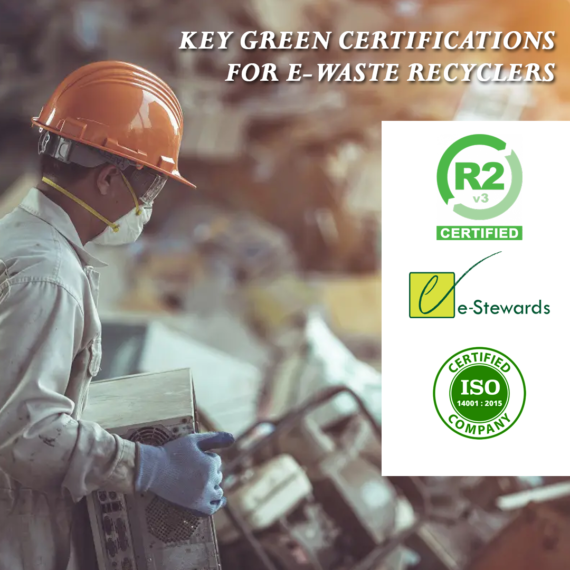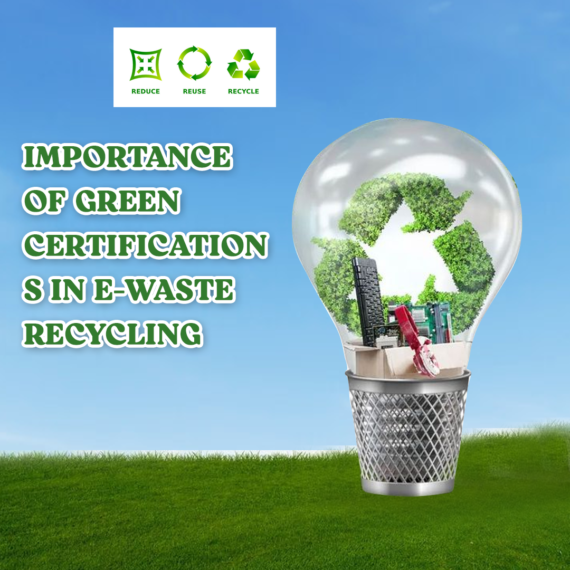
Green Certifications for E-Waste Recyclers: What They Mean and Why They Matter
Ever wondered what happens to your old electronics when you recycle them? You might think they just get dismantled and reused, but there’s a lot more to it, especially when it comes to being environmental friendly. This is where green certifications for e-waste recyclers come in. These certifications are like a stamp of approval that tells you the recycler is doing things the right way, taking care of the planet while handling your e-waste. Let’s understand what these green certifications mean, why they matter, and how they can make a difference.
What Are Green Certifications?
Green certifications are official recognitions given to companies and organizations that meet specific environmental standards. For electronic waste recyclers, these certifications signify adherence to best practices in handling, processing, and disposing of electronic waste. The goal is to minimize environmental impact, protect human health, and promote sustainable practices.
Key Green Certifications for E-Waste Recyclers

1. R2 (Responsible Recycling) Certification
The R2 Certification is one of the most widely recognized standards for e-waste recycling companies in India. It ensures that companies comply with strict environmental, health, and safety standards. R2-certified recyclers are required to:
- Properly manage and document all e-waste streams.
- Ensure safe and secure data destruction.
- Implement systems for responsible reuse and recycling.
- Minimize environmental impact through efficient and safe handling of hazardous materials.
2. e-Stewards Certification
The e-Stewards Certification is another prominent certification focusing on ethical and responsible e-waste recycling. E-Stewards certified recyclers must:
- Follow stringent environmental and social standards.
- Avoid exporting hazardous e-waste to developing countries.
- Ensure worker protection and community safety.
- Maintain transparency and traceability in their recycling processes.
3. ISO 14001 Certification
While not exclusive to e-waste recyclers, ISO 14001 is an important certification that demonstrates a company’s commitment to effective environmental management. ISO 14001-certified recyclers:
- Implement an Environmental Management System (EMS) to reduce their environmental footprint.
- Continuously improve their environmental performance.
- Comply with legal and regulatory standards related to e-waste.
Importance of Green Certifications in E-Waste Recycling

Environmental Conservation: E-waste contains hazardous materials such as lead, mercury, and cadmium, which can dissolve into the soil and water if improperly disposed of. Green certifications ensure that e-waste recyclers implement processes to mitigate environmental pollution. By adhering to strict guidelines for waste handling, recycling, and disposal, certified recyclers minimize the ecological footprint of e-waste and contribute to the conservation of natural resources.
Protection of Human Health: Improper handling of e-waste poses significant health risks to workers, communities, and future generations. Green certifications mandate the adoption of measures to safeguard human health and safety during the recycling process. This includes providing adequate protective gear for workers, implementing safe dismantling and disposal practices, and regularly monitoring air and water quality in recycling facilities. By prioritizing the health of individuals involved in e-waste recycling and those living near recycling facilities, green certifications help prevent adverse health effects associated with exposure to hazardous substances.
Mitigation of Environmental Pollution: E-waste recycling, if not conducted responsibly, can contribute to environmental pollution through the release of dangerous chemicals and greenhouse gases. Green certifications require recyclers to implement pollution prevention measures, such as proper containment and treatment of hazardous materials, emission controls, and energy-efficient recycling processes. By reducing the emission of pollutants into the atmosphere and preventing contamination of soil and water sources, certified e-waste recyclers play a crucial role in mitigating environmental pollution and combating climate change.
Promotion of Circular Economy: Green certifications encourage the adoption of circular economy principles within the e-waste recycling industry. Certified recyclers prioritize resource recovery and reuse by refurbishing or repurposing electronic devices whenever possible. This extends the lifespan of products and minimize the requirement for raw materials and reduces waste generation. By promoting a circular approach to e-waste management, green certifications support sustainable consumption and production patterns and contribute to the transition towards a more resource-efficient economy.
Finding a Green-Certified E-Waste Recycler
Ready to recycle your electronics responsibly? Look for e-waste recyclers certified by reputable organizations like the Responsible Electronics Recycling Coalition (R2) or the e-Stewards® program. These organizations have robust certification processes, ensuring you choose a recycler committed to the highest environmental and social standards.
By opting for green-certified e-waste recycling, you’re contributing to a more sustainable future. So, the next time you upgrade your electronics, contact REECOLLABB directly. We are a certified e-waste management company that handles all kinds of e-waste.
Read Our More Blogs:
How Our E-Waste Collection Services Simplify Disposal for Businesses?
Benefits of Implementing a Zero E-Waste Policy in Your Business







